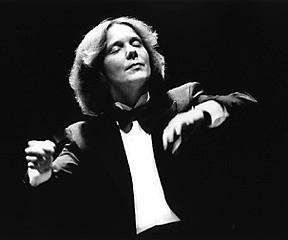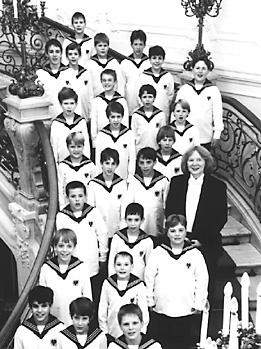Agnes Grossman Leads Vienna Choir Boys by Philip Anson
/ November 1, 1998
Version française...
 The world-famous
Vienna Choir Boys, founded by Hapsburg Emperor Maximilian I in 1498, celebrates its 500th
birthday this year. The Choir is also celebrating its artistic rebirth under its new
Artistic Director Agnes Grossman. La Scena Musicale talked to Maestra Grossman in
Montreal the day before the Choir kicked off its 43-city North American tour. The world-famous
Vienna Choir Boys, founded by Hapsburg Emperor Maximilian I in 1498, celebrates its 500th
birthday this year. The Choir is also celebrating its artistic rebirth under its new
Artistic Director Agnes Grossman. La Scena Musicale talked to Maestra Grossman in
Montreal the day before the Choir kicked off its 43-city North American tour.Grossman is familiar to Canadians as the former director of both the Toronto
Chamber Players and Montreal’s Orchestre Métropolitain. She also taught at the
University of Ottawa and Montreal’s Music Conservatory in the early 80s. Over coffee
and croissants, Grossman outlined the challenges she faces as the first woman director of
the all-male Vienna Boys' Choir.
"Times have changed," declares Grossman, projecting an echt-Austrian
blend of charm and purposefulness, "and the Vienna Boys' Choir must change too."
To judge from her conservatively tailored brown wool suit with horn buttons and rolled-up
sleeves, Grossman’s administrative style is firm, frugal and friendly. She seems just
the person to coax the tradition-bound choir into the twenty-first century.
Grossman, a self-described "builder", is accustomed to
challenges. Her move from Montreal to Vienna two years ago was a promotion from the frying
pan to the fire. During her six-year tenure in Montreal, she built the Orchestre
Métropolitain into the city’s second major ensemble, but her progressive ideas
offended Board Chairman Pierre Péladeau, the brash Quebec tabloid publisher who expected his
orchestra to play Beethoven, Beethoven and more Beethoven.
So Grossman wasn't surprised when she was asked to revitalize the
Vienna Boys’ Choir, which was felt (even by its all-male board of former choir
members) to be outdated and in desperate need of modernization and change.
Everyone agrees the Vienna Boys Choir had gone downhill since the
early 1970s. "The singing quality was not what it should have been," admits
Grossman diplomatically. "I heard a few
concerts and I knew immediately what was wrong," she recalls. In fact, the Choir had
become a tourist trap. The Choir School’s musical education was inadequate. The
curriculum was antiquated and disorganized. Discipline was harsh. The boys were
underfunded, overworked and poorly trained. The Choir’s recording contracts had
lapsed, and Vienna State Opera boss Ioan Holender threatened to cease using their boys in
his productions of Tosca, Carmen, La Bohème and The Magic Flute. diplomatically. "I heard a few
concerts and I knew immediately what was wrong," she recalls. In fact, the Choir had
become a tourist trap. The Choir School’s musical education was inadequate. The
curriculum was antiquated and disorganized. Discipline was harsh. The boys were
underfunded, overworked and poorly trained. The Choir’s recording contracts had
lapsed, and Vienna State Opera boss Ioan Holender threatened to cease using their boys in
his productions of Tosca, Carmen, La Bohème and The Magic Flute.
To make Grossman’s task more difficult, she arrived in Vienna
at the height of the so-called Frauenfrage (Women Question) controversy. The Vienna
Philharmonic, one of the last all-male orchestras in the world, notoriously refused to
accept women into its ranks until forced to do so by the Austrian government. "I was
not directly involved, but, as you can imagine, I never thought the capacity for musical
expression was limited to men."
Grossman was not going to Vienna in order to have her initiatives
shelved and forgotten, as had happened to previous artistic directors. To ensure that her
new policies would be law, Grossman had it written into her contract. Fortunately, the
board was inclined to trust Agnes Grossman because her father Ferdinand had been the
Vienna Choir Boys’ respected artistic director until his death in 1970. "I grew
up near the Choir. I remembered the Choir’s ideal sound, and my father’s
objectives for it. In several ways, I am implementing his policies several decades too
late."
The Vienna Choir Boys is a group of over one hundred singers, ten to
fourteen years old, divided into four choirs of 24 members each. Two choirs tour, while
the other two remain in Vienna. The boys live in the historic Augarten Palace, where they
study academic subjects in the morning and music in the afternoon, with individual voice
lessons twice weekly and a two-hour communal rehearsal every day.
Academic classes are small, with a maximum of eight pupils, so the
boys make up for time lost during their annual three-month tours. "We only accept
intellectually above-average students, otherwise they wouldn’t be able to learn fast
enough," the director explains.
Grossman’s changes have been deep, wide-ranging and
revolutionary. The Choir’s musical curriculum was unified, to improve basic skills
like sight-reading. Multidisciplinary projects will contextualize the music being
performed. "Greater understanding of the social and historical context of music will
lead to deeper understanding of the music and better performances," Grossman hopes.
To improve the quality of life at the Choir’s boarding school, Grossman expanded
leisure, sports and hobby opportunities, hired female staff and even a psychiatrist, to
help the adolescent boys cope with the pressures of performing and living away from home.
The former Spartan dormitories are now divided into semiprivate rooms, housing four boys
each. The strict curfew has been relaxed, and corporal punishment has been suspended.
Grossman approved the appointment of a separate administrative
director to look after the Choir’s day-to-day business. As a result, sponsorships are
on the rise and a record deal is being discussed with Sony.
Traditionally, the Choir was financially self-supporting and proud
of its autonomy, but with the decline in commercial sponsorships, the Choir School is
forced to accept government subsidies for the first time. "I don’t know why the
Choir didn’t accept subsidies sooner. Excessive touring to raise money was hurting
the Choir. My long-term goal is to reduce the choir’s 400 annual appearances by 20
percent," Grossman promises. "Less work, better preparation, and a healthier
living environment are essential to the future of the Vienna Boys' Choir. I want the boys
to have a more normal life and to feel like individuals, not just parts of a machine. If
they are happier, surely they will make better music!"
Version française... |
|


